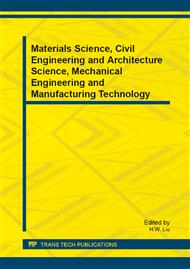p.1371
p.1375
p.1379
p.1383
p.1387
p.1391
p.1395
p.1400
p.1405
Green Design Methods for Mass Customization
Abstract:
With the wide application of MC (mass customization) in manufacturing which can deal with the customer diversification and their individual requirements, the traditional green design method could not meet the demand of product development any more. This paper summarized native and external achievements related to green design and MC, and proposed two correlation methods of product green design: product green design based on product configuration and variant design of product configuration, according to the research of green design method and theory for MC. The two methods provide strong support to enterprises both in theory and method to make green design efficiently. Whats more, it can help develop quick respond ability of enterprises, shorten the development cycle and product cycle, and realize rapid development and lot-size product.
Info:
Periodical:
Pages:
1387-1390
Citation:
Online since:
January 2014
Authors:
Price:
Сopyright:
© 2014 Trans Tech Publications Ltd. All Rights Reserved
Share:
Citation:


